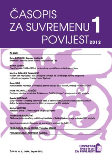Mađari kao neprijatelji: rad Zemaljske komisije za utvrđivanje zločina okupatora i njihovih pomagača. Primjer: kotar Bjelovar
HUNGARIANS AS ENEMIES: THE WORK OF THE HOMELAND COMMISSION IN ESTABLISHING THE CRIMES OF THE OCCUPYING POWERS AND THEIR COLLABORATORS. EXAMPLE: D.B.
Author(s): Martina Grahek RavančićSubject(s): History
Published by: Hrvatski institut za povijest
Keywords: Second World War; Homeland Commission for war crimes; Bjelovar; Hungarians
Summary/Abstract: Crimes committed during the Second World War initiated the question of their processing through criminal law courts at the end of the war. On this basis of this a United Nations Commission for war crimes was established as well as State Commission (with Homeland Commissions subordinate to it) for determining the war crimes of the occupying powers and their collaborators on the territory of Yugoslavia. Hungary was among the defeated powers, so this article analyzes the fate of members of the Hungarian national minority in Yugoslavia, with an emphasis on the area around Bjelovar, who according to the decisions of the Commission were declared to be war criminals or enemies of the people. Generally, their acceptance of all political and military authorities, motivated by the desire to protect their property, largely determined attitude during the war. The relatively mild pressure is evident from numerous indicators which were used by the State Commission, while the same principle is carried over to the area of Bjelovar, where the actions of the Hungarian national minority are shown to be quite positive, not ascribing to it collective responsibility or condemning it for a rather passive stance during the national liberation struggle. Nevertheless, a significant number of decisions put together by the State Commission were not accepted on the part of the United Nations Commission, which clearly indicates a strong pressure on the part of the new Yugoslav government, but points to the fact that in the immediate postwar period there was a desire to overcome wartime memories. The purpose of the work of the Commission was to “bring” justice, but instead it succeeded in ensuring national sense of justice which after the numerous deaths and wanton destruction of the Second World War seemed like an assurance for new and brighter future.
Journal: Časopis za suvremenu povijest
- Issue Year: 44/2012
- Issue No: 1
- Page Range: 37-52
- Page Count: 16
- Language: Croatian

